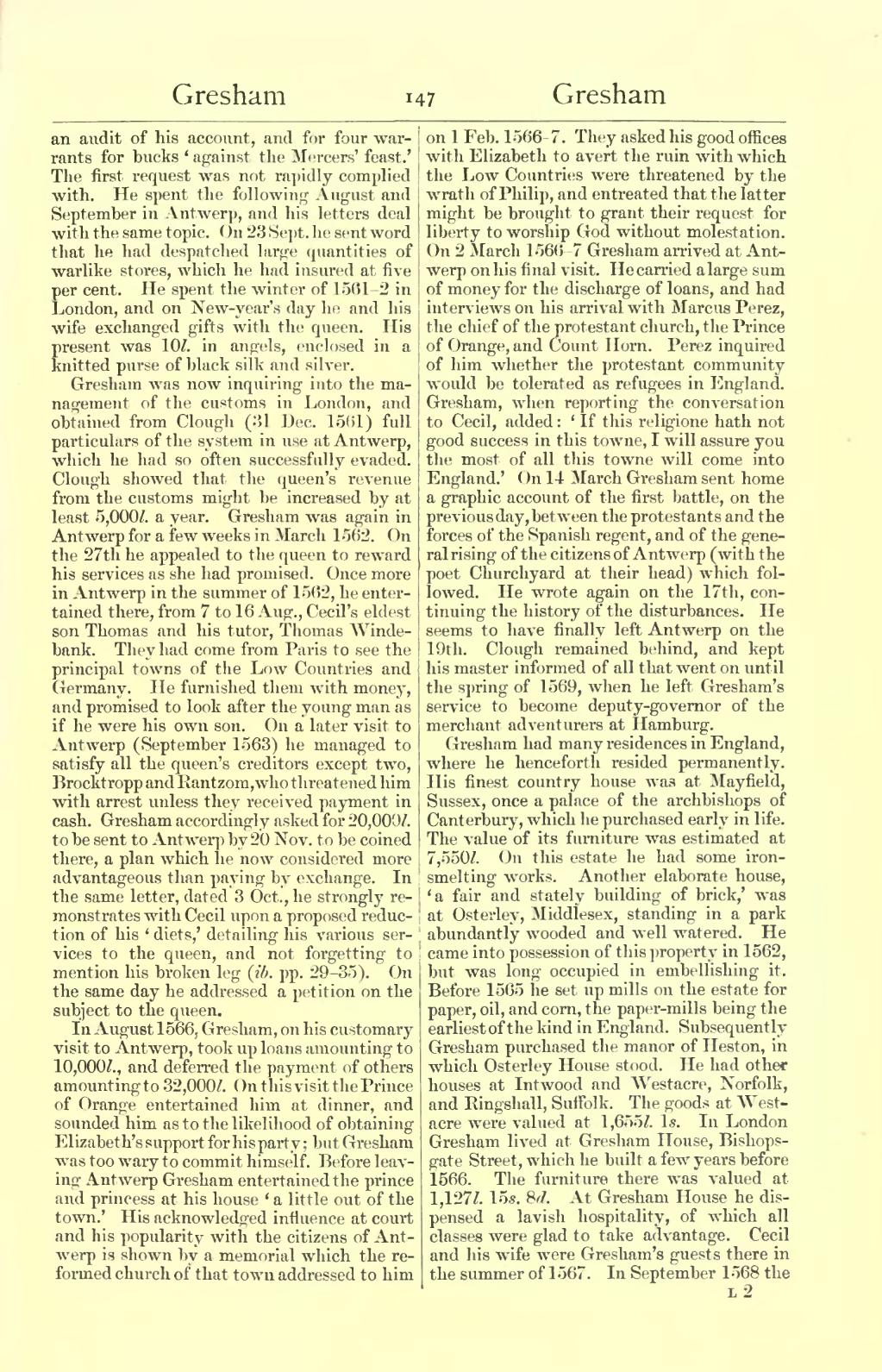an audit of his account, and for four warrants for bucks 'against the Mercers' feast.' The first request was not rapidly complied with. He spent the following August and September in Antwerp, and his letters deal with the same topic. On 23 Sept. he sent word that he had despatched large quantities of warlike stores, which he had insured at five per cent. He spent the winter of 1561-2 in London, and on New-year's day he and his wife exchanged gifts with the queen. His present was 10l. in angels, enclosed in a knitted purse of black silk and silver.
Gresham was now inquiring into the management of the customs in London, and obtained from Clough (31 Dec. 1561) full particulars of the system in use at Antwerp, which he had so often successfully evaded. Clough showed that the queen's revenue from the customs might be increased by at least 5,000l. a year. Gresham was again in Antwerp for a few weeks in March 1562. On the 27th he appealed to the queen to reward his services as she had promised. Once more in Antwerp in the summer of 1562, he entertained there, from 7 to 16 Aug., Cecil's eldest son Thomas and his tutor, Thomas Windebank. They had come from Paris to see the principal towns of the Low Countries and Germany. He furnished them with money, and promised to look after the young man as if he were his own son. On a later visit to Antwerp (September 1563) he managed to satisfy all the queen's creditors except two, Brocktropp and Rantzom,who threatened him with arrest unless they received payment in cash. Gresham accordingly asked for 20,000l. to be sent to Antwerp by 20 Nov. to be coined there, a plan which he now considered more advantageous than paying by exchange. In the same letter, dated 3 Oct., he strongly remonstrates with Cecil upon a proposed reduction of his `diets,' detailing his various services to the queen, and not forgetting to mention his broken leg (ib. pp. 29-35). On the same day he addressed a petition on the subject to the queen.
In August 1566, Gresham, on his customary visit to Antwerp, took up loans amounting to 10,000l., and deferred the payment of others amounting to 32,000l. On this visit the Prince of Orange entertained him at dinner, and sounded him as to the likelihood of obtaining Elizabeth's support for his party ; but Gresham was too wary to commit himself. Before leaving Antwerp Gresham entertained the prince and princess at his house ` a little out of the town.' His acknowledged influence at court and his popularity with the citizens of Antwerp is shown by a memorial which the reformed church of that town addressed to him on 1 Feb. 1566-7. They asked his good offices with Elizabeth to avert the ruin with which the Low Countries were threatened by the wrath of Philip, and entreated that the latter might be brought to grant their request for liberty to worship God without molestation. On 2 March 1566-7 Gresham arrived at Antwerp on his final visit. He carried a large sum of money for the discharge of loans, and had interviews on his arrival with Marcus Perez, the chief of the protestant church, the Prince of Orange, and Count Horn. Perez inquired of him whether the protestant community would be tolerated as refugees in England. Gresham, when reporting the conversation to Cecil, added: 'If this religione hath not good success in this towne, I will assure you the most of all this towne will come into England.' On 14 March Gresham sent home a graphic account of the first battle, on the previous day, between the protestants and the forces of the Spanish regent, and of the general rising of the citizens of Antwerp (with the poet Churchyard at their head) which followed. He wrote again on the 17th, continuing the history of the disturbances. He seems to have finally left Antwerp on the 19th. Clough remained behind, and kept his master informed of all that went on until the spring of 1569, when he left Gresham's service to become deputy-governor of the merchant adventurers at Hamburg.
Gresham had many residences in England, where he henceforth resided permanently. His finest country house was at Mayfield, Sussex, once a palace of the archbishops of Canterbury, which he purchased early in life. The value of its furniture was estimated at 7,550l. On this estate he had some iron-smelting works. Another elaborate house, 'a fair and stately building of brick,' was at Osterley, Middlesex, standing in a park abundantly wooded and well watered. He came into possession of this property in 1562, but was long occupied in embellishing it. Before 1565 he set up mills on the estate for paper, oil, and corn, the paper-mills being the earliest of the kind in England. Subsequently Gresham purchased the manor of Heston, in which Osterley House stood. He had other houses at Intwood and Westacre, Norfolk, and Ringshall, Suffolk. The goods at Westacre were valued at 1,655l. 1s. In London Gresham lived at Gresham House, Bishopsgate Street, which he built a few years before 1566. The furniture there was valued at 1,127l. 15s. 8d. At Gresham House he dispensed a lavish hospitality, of which all classes were glad to take advantage. Cecil and his wife were Gresham's guests there in the summer of 1567. In September 1568 the
